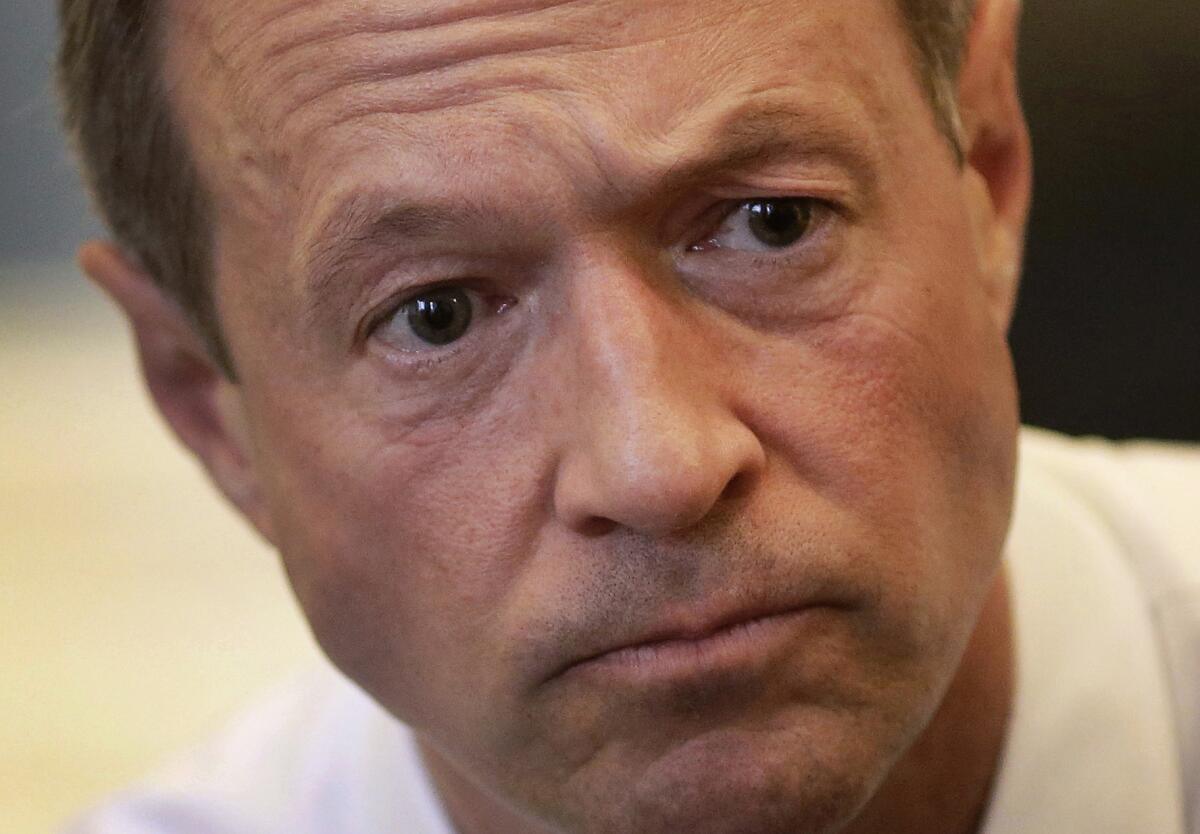Q&A:: Maryland Gov. O’Malley ‘seriously considering’ 2016 presidential run

- Share via
Reporting from Des Moines — As the political world holds its breath, awaiting a go or no-go announcement from Hillary Rodham Clinton, one Democratic presidential prospect is already campaigning. Although a final decision to go forward into 2016 may be months away, Maryland Gov. Martin O’Malley is making all the moves of a serious White House candidate: raising money, visiting early-voting states like Iowa and New Hampshire and traveling overseas to burnish his foreign policy credentials, as this story notes.
After a recent speech to party activists in Des Moines, O’Malley sat down for an interview. Here are selected excerpts:
There are more than 300 million people in this country. Out of all those, why do you look in the mirror and think Martin O’Malley should be president?
What I look at is the challenges that our country faces and I love my country and I know that we can do better. And I have been twice given executive trust by people I serve and both times been able to bring people together in a fundamentally newer, more modern, more collaborative way to achieve important things. So as I look at the challenges we face as a country and I look at my own service, I ask the question as to whether or not our country can do better and whether I can help us do better. And so that’s where I’m at right now.
What skill set, unique to Martin O’Malley, do you have to address the things you talk about?
I think what you see across our country is not only a realization that we have to rebuild our economy from the middle out, but also you see us reforming and rebuilding public administration from our city centers out …
Cities over the last 10, 15 years have become much more collaborative, better-run, inclusive places, places that have embraced new technologies and common platforms in order to achieve results that many thought were impossible 10 or 15 years ago.
You look at the huge reductions in crime as one example of that, but beyond that you see young people wanting to live in cities. You see cities being the center of our metro economies. I think part of this coincides with a new way of leadership that is not ideological, it’s not hierarchical, it’s not bureaucratic, it’s fundamentally entrepreneurial, it’s collaborative and it’s performance-measured with an openness and a transparency because of the Internet that we’ve never had before.
Are those sorts of things you’re talking about manageable at the city level but not necessarily the national level?
They’re manageable at every level and they’re even more essential for management at the national level.… One of the big variables in all of that is the commitment of the executive, is the leader at the center of it. It has to become a discipline for execution and a way of delivering results in order for it to transform a traditional bureaucracy into much more of a results-oriented meritocracy …
All of that sounds like boring management speak, but it’s even more essential at the federal level …
All of this can be changed. We don’t have to accept underperforming bureaucracies, agencies or departments.
If it’s that easy, why isn’t it happening already?
The [technological] tools for doing this are relatively new.… If you force people to coordinate and communicate, create a cadence of accountability, make sure everybody knows what the big goals are, have a compelling scoreboard and make sure everybody knows and you meet and talk about it and work on these problems every week, you’d be amazed … not only how many problems you solve, how much progress you make when you look over your shoulders but also how much creativity you unlock among people that have been doing these sorts of jobs for years and never ever had the opportunity for the face-to-face interaction with their bosses or the people who can change the rules to make them more effective at what they do.…
It’s been slower to arrive at those levels of our government that are less visible than others. Stated in another way, and more positively, the places where it’s been embraced and adopted … has been in America’s cities. America’s cities, for the most part, have become much effective places, have made their cities much more livable, have become much more data-driven, have become much more inclusive and much more respectful of citizens as customers than ever before.
You seem not to lack confidence in your remedies and your abilities. So what’s keeping you from running for president?
I’m seriously considering it.
What’s your thought process? How do you make that decision?
Real human beings do these jobs. And I think any person who feels that they have something needed to offer has to give a lot of thought and a lot of reflection and be very clear that what it is that you have to offer, what mix of experience, insights, talents, desires and hopes do you have an ability to bring forward on behalf of the people that you would serve that would make our country a better place.…
And so that’s the process. And it plays out in multiple conversations. A lot of reading, A lot of listening. Some talking. But mostly listening.
To what extent will your decision be predicated on what Hillary Clinton does or does not do?
It’s not at all at this point.
Follow @markzbarabak for more on national & California politics.
More to Read
Get the L.A. Times Politics newsletter
Deeply reported insights into legislation, politics and policy from Sacramento, Washington and beyond. In your inbox twice per week.
You may occasionally receive promotional content from the Los Angeles Times.











